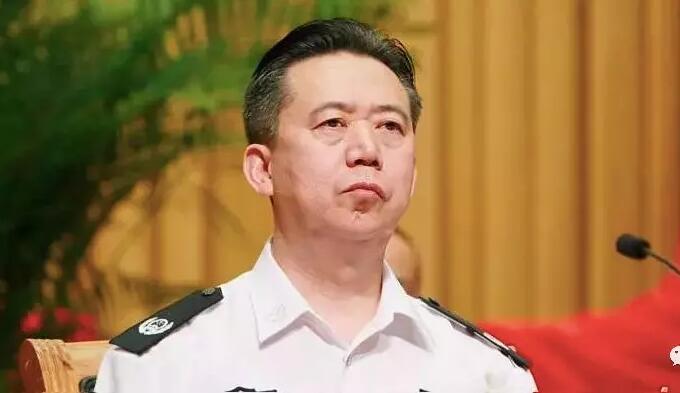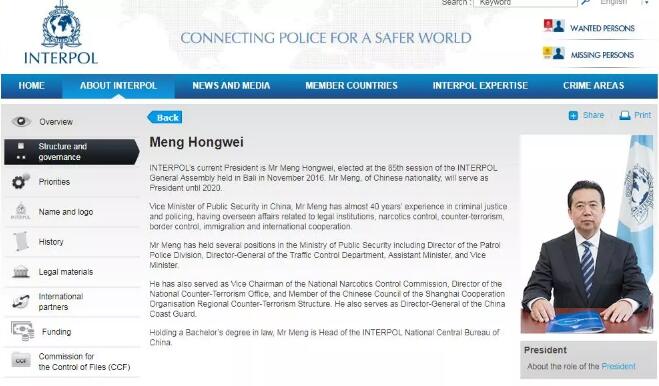At 23:52 on October 7, 2018, according to the website of the Central Commission for Discipline Inspection and the State Supervisory Committee: Meng Hongwei, the vice minister of the Ministry of Public Security, is suspected of violating the law and is currently under investigation by the State Supervisory Committee.
 Meng Hongwei
Meng Hongwei
In the last minutes of the final day of the holiday, a boot falls.The website of the Central Commission for Discipline Inspection and the National Supervisory Committee reported that Meng Hongwei, vice minister of the Ministry of Public Security, is suspected of violating the law and is currently under investigation by the National Supervisory Committee.
The first tiger who only accepts supervision and investigation by the supervisory committee
Some readers should have noticed that Meng Hongwei's sacking notice is shorter than the other big tiger's notices.Since the establishment of the National Supervisory Commission in March this year, the statements in the ministerial-level reports on the sacking of tigers have basically been subject to disciplinary review and supervisory investigations by the Central Commission for Discipline Inspection and the National Supervisory Commission.Meng Hongwei was the first to report that he only accepted the supervision and investigation of the State Supervisory Commission.
Moreover, it was mentioned in the report that Meng Hongwei was suspected of violating the law, not discipline or law.
In March this year, the National Supervisory Commission was formally established, and the Supervision Law was promulgated at the same time.The scope of supervision of the Supervisory Committee is all public officials exercising public power.At the same time, different from the three responsibilities of supervision, discipline enforcement, and accountability of the Commission for Discipline Inspection, the Supervisory Commission performs the duties of supervision, investigation, and disposal, among which the duty of investigation is particularly important.According to the Supervision Law, the main contents of the investigation include suspected corruption and bribery, abuse of power, dereliction of duty, power rent-seeking, profit transfer, favoritism and fraud, and waste of state assets, etc..
From the differences in the statements in the current report, we can feel that the reasons for Meng Hongwei's fall are different from those of previous fallen tigers. However, the specific differences need more official disclosure.
Zhou Yongkang's old subordinate
Meng Hongwei was born in November 1953. He is a native of Harbin, Heilongjiang. He has worked in the public security system for a long time.Since 2004, Meng Hongwei has served as the Deputy Minister of Public Security.
Meng Hongwei's sacking announcement was a bit sudden.In the early hours of this morning, Meng Hongwei was still listed as the second-ranked deputy minister in the leadership information section of the official website of the Ministry of Public Security.His last official event was in Beijing on August 23 when he met Li Zhonghan, the Second Permanent Secretary of Singapore's Ministry of Home Affairs who was visiting China.
But Meng Hongwei's downfall is not without signs.In the past year, he attracted attention twice because of his resignation.The first time was in December last year, when he was dismissed as deputy director of the State Oceanic Administration and head of the China Coast Guard.
The China Coast Guard was reorganized in the 2013 reform of the department system, and Meng Hongwei was the first director.During the reform at that time, the teams and responsibilities of the China Marine Surveillance of the State Oceanic Administration, the Frontier Coast Guard of the Ministry of Public Security, the China Fishery Administration of the Ministry of Agriculture, and the Maritime Anti-smuggling Police of the General Administration of Customs were reorganized and their responsibilities were reorganized under the leadership of the China Coast Guard.
The second time was in April this year, when he no longer served as a member of the Party Committee of the Ministry of Public Security.Meng Hongwei was also a subordinate of Zhou Yongkang.
In December 2002, Zhou Yongkang began to concurrently serve as Minister of Public Security; in June 2003, Meng Hongwei accompanied Zhou Yongkang to Zhejiang for inspection as an assistant minister;1. In July 2004, the Ministry of Public Security held a ceremony to confer the title of Deputy Chief Superintendent of Police. Zhou Yongkang issued police rank order certificates to four people, and Meng Hongwei was one of them.
One more thing, including Meng Hongwei, many of Zhou Yongkang's subordinates have already been dismissed.
In addition to Jiang Jiemin, Wang Yongchun, Li Chuncheng, and Guo Yongxiang who belong to the Petroleum Gang, Secretary Gang, and Sichuan Gang, the representatives of the Political and Legal Gang are Li Dongsheng, former deputy minister of the Ministry of Public Security and former deputy secretary of the Party Committee, and Zhang, member of the Standing Committee of the Hebei Provincial Party Committee and secretary of the Political and Legal Committeecross.
Interpol issued a missing person notice
During the Ministry of Public Security, Meng Hongwei was in charge of international cooperation and other affairs, and served as the director of the Interpol China National Central Bureau.In addition, he also has an international attention-grabbing status.
On November 10, 2016, Meng Hongwei was elected as the new chairman by a high vote at the 85th Interpol General Assembly. This is also the first Chinese chairman of Interpol since its establishment.

△Introduction to Meng Hongwei on the Interpol website
The chairman of Interpol has been in office for four years, and Meng Hongwei is still in office.
Interpol was founded in 1923 and is headquartered in Lyon, France.This is a cooperation organization for countries to combat criminal crimes. It is the only global police cooperation organization and the second largest intergovernmental international organization after the United Nations. It currently has 190 member states. Its main responsibility is to investigate terrorist activities and organized crime.Crime, narcotics, arms smuggling, smuggling, money laundering, child pornography, technology crime and corruption, etc., are large and serious transnational crimes, but there is no law enforcement power.
The red notice that everyone is familiar with is issued by Interpol.
In April 2015, the China National Central Bureau of Interpol announced the list of 100 red notices to the outside world, listing them as key targets in the pursuit of fugitives and stolen goods. By the beginning of this year, 52 people had been brought to justice.
There have been constant rumors about Meng Hongwei's demise, but there has been no official news until today.On the official website of Interpol, there is a special missing person notice about the current chairman.
On October 6, Interpol Secretary-General Jurgen Stock (Jurgen Stock) issued a statement:
6 October 2018
INTERPOL Secretary General Stock: INTERPOL has requested through official law enforcement channels clarification from Chinasquo;sauthorities on the status of INTERPOL President Meng Hongwei. INTERPOLrsquo;s General Secretariat looks forward to an official response from Chinasquo;sauthorities to address concerns over the Presidentsquo;swell-being.
Interpol has made a request through the official law enforcement department, hoping that the Chinese government will explain the current situation of Interpol Chairman Meng Hongwei and formally respond to the concerns of the Interpol General Secretariat about the chairman.
Former Director of Counter-Terrorism Office
In addition to the international arena, Meng Hongwei also had a status that cannot be ignored in China——director of the National Counter-Terrorism Office.
Meng Hongwei first appeared in public reports in this capacity in 2011.At that time, violent and terrorist crimes occurred successively in Hotan and Kashgar, Xinjiang, causing heavy casualties to innocent people and seriously affecting Xinjiang's economic and social development and ethnic unity..
On August 4 of that year, the National Anti-terrorism Work Coordination Group held a national anti-terrorism work conference in Urumqi.Meng Hongwei attended the meeting and delivered a speech as Vice Minister of Public Security and Director of the State Counter-Terrorism Office.
On April 23, 2013, a serious violent terrorist crime occurred in Bachu County, Xinjiang.Terrorists launched a surprise attack on law enforcement officers engaged in daily work and unarmed community service personnel, causing heavy losses, and 15 community cadres and police officers died.On April 28, all 25 members of the violent terrorist gang were brought to justice.
On April 29, Meng Hongwei, director of the National Anti-Terrorism Office and deputy minister of the Ministry of Public Security, said in an interview with CCTV that cracking down on violent terrorist activities is my country's established policy, and no responsible country can tolerate terrorist activities.For those criminals who do not want to repent, continue to challenge the legal system, defy the law, and carry out violent terrorist activities, we will take all necessary means to resolutely crack down on them and punish them severely according to the law.
Give a background.
In 2001, the National Anti-Terrorism Coordination Group was established, responsible for coordinating the anti-terrorism actions of various departments and regions. In 2002, the Ministry of Public Security established the Anti-Terrorism Bureau, which is responsible for research, planning, guidance, coordination, and promotion of national anti-terrorism work.The Office of the National Anti-Terrorism Coordination Group is also established in the Anti-Terrorism Bureau of the Ministry of Public Security to undertake the daily work of the coordination group.
Four months after the 4middot;23 violent terrorist incident in Xinjiang, that is, on August 27, 2013, the first plenary meeting of the National Anti-Terrorism Work Leading Group was held in Beijing.Terrorist Work Steering Group established.
The leading group is the deliberation and coordination body of the State Council, under which the National Counter-Terrorism Office is responsible for specific work.According to reports at the time, the first team leader was then State Councilor and Minister of Public Security Guo Shengkun, and the first director of the Counter-Terrorism Office was Li Wei, the former vice minister of the Ministry of Public Security who had just stepped down in August this year.



